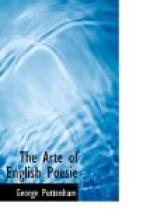or at least wise a witnes, is no little griefe and
infelicity. Therfore nature and ciuility haue
ordained (besides the priuate solaces) publike reioisings
for the comfort and recreation of many. And they
be of diuerse sorts and vpon diuerse occasions growne:
one & the chiefe was for the publike peace of a countrie
the greatest of any other ciuill good. And wherein
your Maiestie (my most gracious Soueraigne) haue shewed
your selfe to all the world for this one and thirty
yeares space of your glorious raigne, aboue all other
Princes of Christendome, not onely fortunate, but
also most sufficient vertuous and worthy of Empire.
An other is for iust & honourable victory atchieued
against the forraine enemy. A third at solemne
feasts and pompes of coronations and enstallments
of honourable orders. An other for iollity at
weddings and marriages. An other at the births
of Princes children. An other for priuate entertainements
in Court, or other secret disports in chamber, and
such solitary places. And as these reioysings
tend to diuers effects, so do they also carry diuerse
formes and nominations: for those of victorie
and peace are called Triumphall, whereof we
our selues haue heretofore giuen some example by our
Triumphals written in honour of her Maiesties
long peace. And they were vsed by the auncients
in like manner, as we do our generall processions
or Letanies with bankets and bonefires and all manner
of ioyes. Those that were to honour the persons
of great Princes or to solemnise the pompe of any
installment were called Encomia, we may call
them carols of honour. Those to celebrate marriages
were called songs nuptiall or Epithalamies,
but in a certaine misticall sense as shall be said
hereafter. Others for magnificence at the natiuities
of Princes children, or by custome vsed yearely vpon
the same dayes, are called songs natall or Genethliaca.
Others for secret recreation and pastime in chambers
with company or alone were the ordinary Musickes amorous,
such as might be song with voice or to the Lute, Citheron
or Harpe, or daunced by measures as the Italian Pauan
and galliard are at these daies in Princes Courts
and other places of honourable of ciuill assembly,
and of all these we will speake in order and very
briefly.
CHAP. XXIIII.
The forme of Poeticall lamentations.
Lamenting is altogether contrary to reioising, euery man saith so, and yet is it a peece of ioy to be able to lament with ease, and freely to poure forth a mans inward sorrowes and the greefs wherewith his minde is surcharged. This was a very necessary deuise of the Poet and a fine, besides his poetrie to play also the Phisitian, and not onely by applying a medicine to the ordinary sicknes of mankind, but by making the very greef it selfe (in part) cure of the disease. Nowe are the causes of mans sorrowes many: the death of his parents, friends, allies, and children: (though many of the barbarous nations do reioyce at




